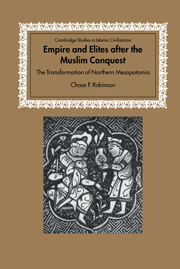Book contents
- Frontmatter
- Contents
- Preface
- Acknowledgements
- List of abbreviations
- Note on dates and citations
- Map: The Fertile Crescent in the early Abbasid period
- 1 Conquest history and its uses
- 2 The seventh-century Jazira
- 3 From garrison to city: the birth of Mosul
- 4 Christian élites in the Mosuli hinterland: the Shahārija
- 5 Islam in the north: Jaziran Khārijism
- 6 Massacre and narrative: the Abbasid Revolution in Mosul I
- 7 Massacre and élite politics: the Abbasid Revolution in Mosul II
- Conclusion
- Bibliography
- Index
- Other titles in the series
2 - The seventh-century Jazira
Published online by Cambridge University Press: 13 August 2009
- Frontmatter
- Contents
- Preface
- Acknowledgements
- List of abbreviations
- Note on dates and citations
- Map: The Fertile Crescent in the early Abbasid period
- 1 Conquest history and its uses
- 2 The seventh-century Jazira
- 3 From garrison to city: the birth of Mosul
- 4 Christian élites in the Mosuli hinterland: the Shahārija
- 5 Islam in the north: Jaziran Khārijism
- 6 Massacre and narrative: the Abbasid Revolution in Mosul I
- 7 Massacre and élite politics: the Abbasid Revolution in Mosul II
- Conclusion
- Bibliography
- Index
- Other titles in the series
Summary
In describing the conquests, Muslim historians and jurists are arguing that the kerygma of the Arabic-speaking one God was to take political expression beyond the Arabian Peninsula. The world, not just the Meccans, Ḥijāzīs, or Arabs, was to acknowledge the dominion of God, duly delegated first to His Messenger and then his deputies. The universal currency of this acknowledgement was to be tribute: an alms tax (usually called the sadaqa) for those who professed Islam, and for those who did not, a head tax (usually called the jizya). This is a fairly sophisticated view of political power, and one that legitimises not only the Syrian post-prophetic state, but also its claims on revenue, in part by rationalising in theocratic terms the community's conquests: whatever their truth, accounts that have Muḥammad campaign at Tabūk shortly before his death press the Prophetic imprimatur on military engagements outside the Peninsula. Sophisticated ideas usually take some time to become sophisticated, however; and as far as the Umayyad al-Jazīra is concerned, there is no good evidence that this classical view of sovereignty and power applied. The constituent elements ingredient to later, classical views can be identified relatively early on, but the system emerged only secondarily.
To understand seventh-century history in the north we must disabuse ourselves of the anachronistic conceptions of territory and power that underlie our ninth-century sources.
- Type
- Chapter
- Information
- Empire and Elites after the Muslim ConquestThe Transformation of Northern Mesopotamia, pp. 33 - 62Publisher: Cambridge University PressPrint publication year: 2000



